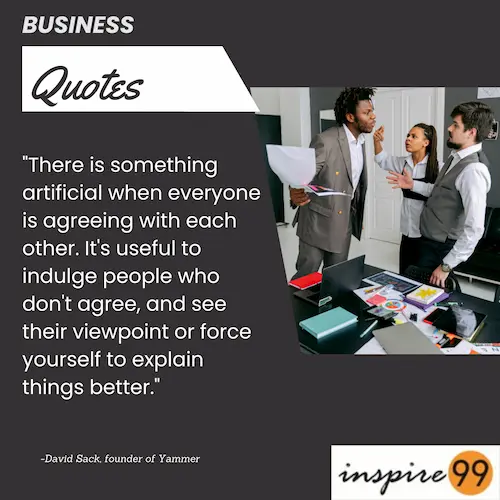There’s something artificial when everyone is agreeing: It’s weird when everyone agrees in a team or organisation. Sure, there will be moments like that but if it is a pattern in your founding team, then there are two problems: the leader’s too strong or you don’t have challengers. Either way, it is a sign that something is terribly wrong and you as a founder will need to act on it.
Any startup/innovation thrives on the healthy debate to progress. It forces you to think in a different way and come up with different solutions. Or else you run the risk of creating echo chambers that ruin innovation.
“There is something artificial when everyone is agreeing with each other. It’s useful to indulge people who don’t agree, and see their viewpoint or force yourself to explain things better.”
-David Sack, founder of Yammer
There’s something artificial when everyone is agreeing
What is the meaning of there is something artificial about everyone agreeing? I’m sure each of us has our own line of thought experiences and exposures. It is fairly naive to assume that we all think the same and have the same opinion about every strategic direction. So if people don’t have the same opinion, then it might mean that there isn’t enough diversity or representation in the team, to engage with a different line of thought. I love the way this is expressed in the book rebel ideas by Matthew Syed.
So, if everyone is agreeing, maybe it’s time to think and ask a question about your approach or the culture that you’re creating. As a leader or founder, it is your responsibility to create a safe enough environment for people to have respectable conflict to move ahead.

What happens when everyone agrees?
If Everyone agrees you can be sure that people don’t care enough to fight with you. Maybe you’re in the wrong company for a startup. And if this is your founding team as a small business, these are early signs of problems in the business. Forget your ego or want to be the smartest person in the room. That culture is gone and no one really enjoys that anymore. The purpose/cause is more important than individual egos in a business setup.
Your confidence need not come from having all the answers. Most startups don’t have all the answers. But the important thing is to have the desire to find out these answers.
Face the truth even if it hurts: The truth might sometimes tell you that you’re wrong. That’s great, isn’t it, it’s helping you prevent a mistake. And when you accept your mistakes at ease, it sends a message to others about having healthy conflicts and fostering candid feedback in the company.
Accepting Criticism
As a founder, you’re bound to get some criticism. There is nothing more awful than wasting a lot of time, resources and emotion on something which could have been prevented with an open discussion. Try questioning the motive behind every support or doubt on your ideas.
Why are these people telling you this? What is their agenda and what do they have to gain? It is business, and personal relationships are great. But, that alone doesn’t help your business. You need someone who objectively thinks, not someone who doesn’t tell you the bare truth to take care of your feelings.
Why do we need healthy conflict?
A healthy conflict creates a culture of openness. Most people who come to work for a startup quit large companies because they’re too bureaucratic. It is hard to affect change, or even argue in a larger company. In a startup, things can move faster. It gives everyone an opportunity to be a change. agent and have their views represented properly.
Healthy conflict makes everyone feel heard. It also creates a culture of openness and fun. Remember, this is probably one of the main reasons why people come to work for a startup.
Challenges often mean creativity:
Challenges often have meant an opportunity for creativity. They have led us in directions which we never thought were possible. It has helped me think about solutions differently. Great learning in the startup environment has been that there is more than one way to come to the final solution – ‘A creative man is motivated by the desire to achieve – Ayn Rand!’. Creativity is a learned skill sometimes. As long as you stay focused on your final goal, you can get the answers to your naysayers.
2.3 Not all questions need answers:
This perhaps is our most important tip. Throughout your journey, there will be questions to keep you occupied. It doesn’t necessarily mean that you have to answer all of them. Find answers to the ones which make sense to the business. Don’t bother responding to everything that is thrown at you! Sometimes, you get a lot of solace from silence than from trying to shut everyone else. Choose your battles carefully. You only have limited energy to spend, why waste it on unnecessary things?
As always, your true answers lie in the balance between yes men and your nay sayers. As you navigate between the two, do keep the above factors in mind. They might help you when you think of your strategies. Don’t always be surrounded by your yes men, the nay sayers have a very important role to play. You need people who challenge you and make you think. And that’s the essence as we leave you with this quote
“There is something artificial when everyone is agreeing with each other. It’s useful to indulge people who don’t agree, and see their viewpoint or force yourself to explain things better.”
-David Sack, founder of Yammer

Pingback: You don't need to be the biggest brand in the world to start-Startup101 - Inspire99
The value of human capital brought out so well.. All in equal measures
Thank you, I think as a startup, that’s the best resource one can afford. It is really hard to attract the right kind of talent esp with limited resources at hand. However, if we play it right, the startup can be a very good way to reach the end results and keep everyone involved excited.
In my previous experience, depending on the type of field, we always found people who were really excited. But not all of them would stick for long, so we had to evolve a mechanism to keep the best ones interested. Also a startup is certainly not for someone who likes everything too structured. There is always room for change and modification throughout the development of a company, customer profile and associated activities..
Group-think does lead to total elimination of individual creativity
True Suman, although such a simple message, I am amazed as to how many times it is not heeded for. I have been in teams where a leader is obviously wrong by miles, but there is no response from the team mates. In fact I have been in a place where I have told nothing to the leader although I knew it was a mistake for the business. In my experience, this leader was quite a nightmare to work with, impossible person to offer any feedback to. I guess it is a two way street. Now that I look back on this post, I realise I have not addressed the importance of a leader or a startup lead to understand and make themselves available for feedback. It makes no sense to lose out on good ideas just because the leader is unwilling to listen. After all intelligence or business sense is not concentrated only in one person. It takes more than that one person to lead a business to success.